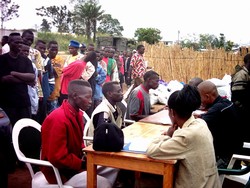 A "massive disarmament" took place in the Democratic Republic of Congo last week, days before a deadline. Hundreds of militiamen who were fighting in the bush, including at least 18 children surrendered, one explaining it was for the good of his country. They were given some supplies, money and a certificate for rejoining a community of their choice.
A "massive disarmament" took place in the Democratic Republic of Congo last week, days before a deadline. Hundreds of militiamen who were fighting in the bush, including at least 18 children surrendered, one explaining it was for the good of his country. They were given some supplies, money and a certificate for rejoining a community of their choice.
"I have surrendered my weapons at last, to help rebuild my country," Ngajole Lipri, one of the disarmed militia leaders, said on Wednesday at a disarmament site it Bunia, the main town in Ituri District, Orientale Province…
At least 1,100 former militias have arrived at transit sites in Ituri, northeastern Democratic Republic of Congo, in the past three days, ahead of a 30 June ultimatum by the Congolese army for them to disarm, an official said.
Another ex-combatant, Sylvie Mave, 20, urged others still in the bush to disarm. "We have left the suffering in the bush," she said.
The number of militiamen surrendering their guns at the 12 transit sites across the district is overwhelming, an official of the National Disarmament Commission, known by its French acronym CONADER, said.
The officer in charge of CONADER’s community office in Ituri, François Nguz, said one of the sites that had initially planned to accommodate 100 ex-combatants per day had received 280 in two days.
The United Nations Children’s Fund (Unicef) identified 18 children, including one girl, among the disarmed militiamen.
Those who surrendered weapons included 600 in Nizi, Fataki and Dele sites, Stany Kituma, a site manager said.
"These are the real militiamen – those who were fighting in the bush – who are surrendering. This was not the case in the past," a disarmament official, who requested anonymity, said.
On arrival in Bunia, the militias are received by the Moroccan contingent of UN peacekeepers. Then, the former militiamen receive a kit comprising pans, toothbrushes, clothes and shoes for their two-day stay at the site.
CONADER then conducts identification of the ex-combatants to determine those who had returned to the bush a second time. So far, none have been detected, Diyongo, the CONADER official, said.
Those disarmed are then taken through an orientation process and then choose either to enlist into the army or the community of their choice. As yet, none has chosen the army.
"The ex-combatants opt to stay," Diyongo said. "They gain more by being reintegrated into the community."
Before they leave the disarmament sites, each is paid US $110 and given two pans, a radio and tarpaulin sheets for shelter. They also get a disarmament certificate.
(IRIN News)



















